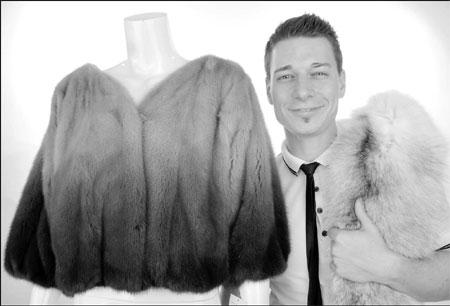
He is young and willing and has definite ambitions on the warm and fuzzy. Meet David Ubl, fur designer. Provided to China Daily
German designer who started sewing at age 10 hopes to make his mark in China with fur, Alexandra Leyton Espinoza reports.
He is the youngest chief designer of fur in the world, third runner-up on a German-television fashion reality show and winner of the Gold Hempel award for young designers in 2008. For 27-year-old German native David Ubl, the next step will be to expand his own brand in China.
He was "so excited" to show his summer collection in Beijing recently. "The line is very clean, sexy, young with a touch of luxury. A little twist to the more conservative fashion scene in Beijing," he says.
Ubl always dreamed of becoming a designer, once his mum showed him the practical skill of using a sewing machine. He started to make his own clothes at the age of 10 and soon made costumes for his friends.
"And I've never stopped sewing since. My mum used to say I could sew better than she could," he says.
After high school he moved to the US to study creative fashion design and pattern making at the School of Fashion Design in Boston, followed by New York's Fashion Institute of Technology and later finished his studies in Berlin and Paris.
"When I was chosen to come to Beijing and compete in China's international fashion week, all I knew about China was that the Italian brand Fendi had had their first-ever fashion show on the Great Wall and that Chinese people love the color red," Ubl says with a smile.
After winning the Gold Hempel award for best international collection, Ubl went back to Berlin to finish his studies. During his graduation he was headhunted by Hempel, one of the biggest textile producers in China, to come back to Beijing and work as their creative director.
"I trained Chinese designers to be more open minded in their way of designing. The creations in China can sometimes tend to be too overloaded or too minimalistic. I tried to help them to find a good balance."
One year later, he was offered the role of chief designer for Beijing Sunry Longtai Fur Manufacturing Co Ltd, one of China's largest fur fashion houses.
"I had never worked with fur when I first came to Beijing, but I still said 'yes' when Sunry Longtai offered me the chance to design a collection for the fur fair in 2009. I had to learn and follow the whole process from scratch.
"The numerous anti-fur campaigns reached their peak in the 1980s and '90s and many celebrities participated by boycotting fur. Fur companies closed down and the skill of designing with fur had become very limited."
According to Ubl, in today's fashion scene in China, artistic freedom and market demand has made fur acceptable.
Ubl believes the fur industry is growing in China as a result of a relaxed cultural perspective and a boatload of new money. Wealthy consumers want to make a splash in luxury goods, with fur being one of the sought-after items.
"Chinese people were once quite modest about their wealth, but that's changing now and they want to show it off. Wearing fur is one way to do this," he says.
During one of the International Fur Trade Federation events the director of the federation asked Ubl his age, and soon after he was handed a certificate that recognized him as the world's youngest chief designer of fur.
Ubl says his costs are pushed up because his materials are imported from Sweden, Denmark and Canada. Ubl says even though China's fur breeding industry is developing, factors like water, food and climate play important roles in producing good quality fur.
This means that companies that buy minks from Sweden to be raised elsewhere, can often end up with substandard results.
"When you design a coat collection, the fur must come from one country only," he said. Imported fur that is quality-assured and certified is the preferred choice.
"When I tell people that I work as a fur designer I get very mixed reactions, but the moment they feel the fur, they like it. The better the treatment of the animal, the better the fur, in a world with leather shoes and belts it is hard to put fur in a bad place," he says.
"With hard work, I have been able to build my own brand and develop myself as a fur designer. In China you have the opportunity to be recognized and be respected for your work, no matter your age. You have almost no limits," he says.
"Even if inflation for the past years have had a bad impact on the economy, the fur industry has continued its steady rise. As a designer I feel comfort in watching people on the subway getting more and more fashionable.
"Beijing and its people give me inspiration for my designs."





